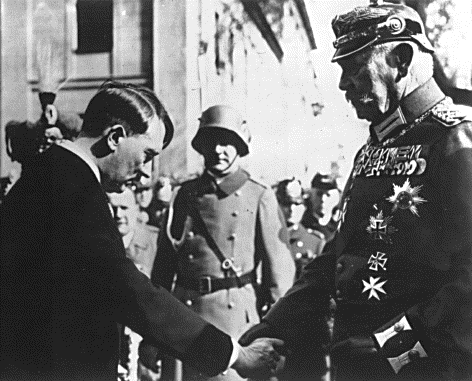
“1929-1932, Germany is hard hit by the Great Depression. Prussian businessmen seek government bailouts with no success. The big industrialists in the Ruhr dream of expansion.”
“The Junkers give President Hindenburg a landed estate as a gift in an effort to win his sympathy for their cause.”
“In autumn of 1932, Adolf Hitler’s party is threatened with bankruptcy and disintegration. To save the situation Hitler tries desperately to have himself appointed Chancellor, but Hindenburg refuses to see him.”
“In January 1933 Hindenburgh appoints Hitler Chancellor in return for a promise to prevent the exposure of the Osthilfe (East Aid) scandal, in which Hindenburgh himself is implicated.
After coming to power legally, Hitler surprises his industrialist benefactors with his extremely violent tactics, but keeps his promises.”
Believed to have taken lessons from a provincial actor, Hitler transforms himself into a statesman.”
“February 1933, The Reichstag Fire. Hitler accuses his enemies of instigating the fire and gives the signal for the Night of the Long Knives.”
“The Supreme Court in Liepzig condemns an unemployed worker to death for causing the Reichstag fire. The real incendiaries got off scot free.”
The impending death of the aged Hindenburg Provokes bitter struggles in the Nazi camp. The Junkers and industrialists demand Rohm’s removal...”
“On the night of June 30 1934 Hitler overpowers his friend Rohm at an inn where Rohm has been waiting for him. Up to the last minute Rohm thinks that Hitler is coming to arrange for a joint strike against Hindenburg and Goring.”
“The occupation of Austria is planned.”
“Under duress the Austrian Chancellor Engelbert Dolfuss agrees to stop the attacks on Hitler that have been appearing in the Austrian press.”
Gun fire! Loud and sudden!
“Dollfeet is murdered at hitler’s instigation, but Hitler goes on negotiating with Austrian rightist circles.”

Unemployed people standing in line in front of an employment office in Hanover in 1930
France occupied the Ruhr area of Germany when reparations could not be paid

The Junkers were anti-democratic members of the landed nobility in Prussia. They owned great estates that were maintained and worked by peasants with few rights.
Estate gifted to President Hindenburg with the idea that "if Prussia ruled Germany, the Junkers ruled Prussia, and through it the Empire itself."


President Hindenburg (pictured below) was born into a wealthy Junker family.

The Osthlife policy produced a major scandal in Germany. A considerable number of Junkers, including the Hindenburgs, were found out to have wasted government money on luxury items.

Hitler is appointed Chanceller

Hitler and Hindenburg
Hitler asked to be made chancellor. Hitler was offered the job of vice-chancellor but he refused. Hitler saw this offer as placing him in a position of "playing second fiddle" in the government
Hitler asked to be made chancellor. Hitler was offered the job of vice-chancellor but he refused. Hitler saw this offer as placing him in a position of "playing second fiddle" in the government
Fearful of Hitler's electoral gains, the government turned away from legal means and increasingly towards violence, resulting in many Nazi leaders being imprisoned
Hitler releases all imprisoned Nazi party members





Hitler acting. Taken by his personal photographer
Fearing that the paramilitary SA had become too powerful, Hitler ordered his elite SS guards to murder the organization's leaders, including Ernst Röhm. This was known as "The Night of the Long Knives"
The Reichstag fire was an arson attack on the Reichstag building in Berlin on 27 February 1933, just one month after Adolf Hitler had been sworn in as Chancellor of Germany.


On the night of February 27, 1933, an unemployed Dutch construction worker named Marinus van der Lubbe set fire to the Reichstag building, causing serious damage. The Nazis blamed the Communists for the fire and claimed emergency powers to crush all opposition.


As early as April 1934, Himmler and Heydrich began to conspire with Göring to persuade Hitler to eliminate Röhm. In mid-June 1934, they planted rumors and evidence that Röhm was planning to overthrow the regime.
Hitler persuaded Röhm to order the top SA leadership to take an extended leave on June 8, 1934.

Hitler ordered Röhm to assemble the top SA leaders at a Bavarian spa in Bad Wiessee. SS units, surprised the SA leaders on the morning of June 30 and transported them to Munich's Stadelheim prison. There SS men shot most of them.
On July 1st, at the Nazi dictator's expressed order, Eicke shot Röhm in his cell in Stadelheim. Röhm reportedly died with the words “Heil Hitler” on his lips.

Hitler wanted all German-speaking nations in Europe to be a part of Germany. To this end, he had designs on re-uniting Germany with his native homeland, Austria. Under the terms of the Treaty of Versailles, however, Germany and Austria were forbidden to be unified. In an attempt to realise his goals, Hitler was determined to destabilise Austria and undermine its independence. His ultimate goal was anschluss (union) with Austria.

The Austrian Chancellor, Dollfuss, tried to crack down on the Socialists and Nazis - political factions that he thought were tearing the country apart. Dollfuss banned the Nazi party.
In 1934, Hitler ordered the Austrian Nazis to create havoc in Austria. This turned into an attempt to overthrow the government. Chancellor Dollfuss was murdered but the attempted coup failed because the Austrian military intervened to back up the government.

